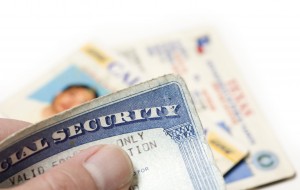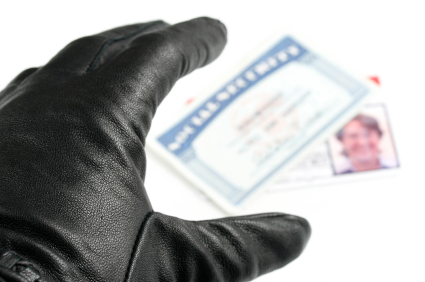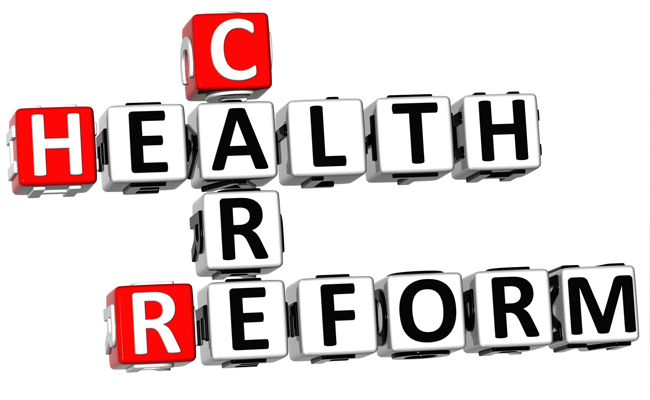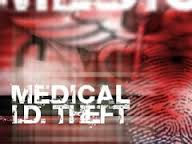Posts Tagged ‘medical identity theft’
Identity Theft and Medical Identity Theft: Why and How You’re at Risk
 Identity theft, including medical identity theft, is a growing threat in the United States. Unfortunately, too many consumers, healthcare providers, and businesses of all types and sizes ignore this threat.
Identity theft, including medical identity theft, is a growing threat in the United States. Unfortunately, too many consumers, healthcare providers, and businesses of all types and sizes ignore this threat.
The latest statistics still show that one out of four consumers have their identity stolen, equating to about 11.6 million identity theft victims a year. It’s also estimated that some sort of data breach will affect one out of ten consumers, and one out of eight patients will become a victim of medical identity theft.
The cost of identity theft is devastating. Hackers and thieves buy Social Security numbers for just $1.00, but you’ll spend thousands of dollars and countless hours recovering your identity. On the other hand, a person’s medical identity averages just $50, but insurance companies and the patients affected could spend millions in recovery costs.
All It Takes is the Right Data
Identity thieves only need a few key items to steal an identity. A Social Security number, name, date of birth, and a driver’s license number can reveal everything a thief needs. Thanks to the Internet, identity thieves can go to work doing reverse lookups and other searches using the limited information they find, and then gather the other data they need to steal your identity.
Thieves have several outlets at their disposal to steal identities, including:
- Dumpster diving (or your own trash cans)
- Stealing mail
- Check washing
- Stealing wallets and purses
- Performing telephone and email scams
- Obtaining death records
It’s Not Just Professionals
Identity theft is not just perpetrated by professional thieves. In fact, relatives and friends of victims—and even healthcare workers—steal identities every day. Cyber thieves are the most common in data breaches and system hacks.
Everyone is at Risk for Identity Theft
While the elderly are common targets of identity theft, they’re certainly not the only people at risk. Elderly individuals are, however, at higher risk because most are not computer savvy, do not know how to check their credit reports, and are more trusting, which means they’re more likely to fall victim to scams.
The second most vulnerable group is children. Children have clean credit slates and most parents are not proactive at monitoring their child’s credit report. Parents can, however, sign up their children for CreditKarma.com to keep an eye on their credit profile. Also, parents should teach their children to never share personal information (including dates of birth and Social Security numbers) with people they don’t know.
The deceased are also at risk for identity theft. Sadly, thieves look for obituaries to find the information they need to steal the deceased person’s identity. Since most family members do not check the credit of their deceased loved ones, it can be years before the identity theft is ever noticed.
Veterans are also at risk. Because they leave the United States for extended periods, serving their country, thieves take advantage of the fact that they’re unlikely going to check their credit report.
Lastly, people who use social media unwisely are at risk for identity theft. This is because they publicly broadcast their personal information and leave it ripe for the taking by identity thieves.
Medical Identity Theft Cases Are on the Rise
While identity theft is a common occurrence, medical identity theft is growing quickly as well. It’s estimated that 5.8 percent of identity theft cases are medical identity theft crimes—and most arise from medical data breaches. But medical identity theft is also dangerous. It can result in not receiving the right type of treatment due to incorrect medical records, which can lead to adverse reactions and, worse, death.
Preventing Identity Theft
There are many steps you can take to protect yourself from identity theft. While there isn’t a 100 percent effective method to prevent it, these steps are proven to limit the likelihood of your identity being stolen in the future.
- Become a member of ID360, the only identity theft protection company that’s run by law enforcement and recovers your identity after it’s stolen.
- Shred everything that has your name, address, and personal information on it (including junk mail).
- Place a fraud alert with credit bureaus so that they scrutinize new credit accounts.
- Use a gel pen so that your checks and signatures cannot be washed.
- Never put your Social Security number on documents and do not carry your Social Security card with you.
- Review your credit reports annually and look for any unauthorized applications or accounts.
You must take your prevention steps even further to prevent medical identity theft:
- Always check your explanation of benefit documents you receive in the mail, and make sure the services you are charged for were actually received.
- Request and review an annual “benefits paid” statement from your insurance company.
- Keep copies of your own health records for reference.
- Never share your insurance card with anyone.
- Shred medical documents when they are no longer relevant.
- Do not take advantage of free medical care or surveys.
- Report a stolen insurance card immediately.
- Never throw away prescriptions with your name on it.
What to Do When Your Identity is Stolen
There are things you can do to lessen the impact identity theft and medical identity theft have on your life:
- Call 877-ID-Theft and speak to the FTC immediately.
- Call your local police department and file an official report.
- Put a fraud alert on your credit report with all three credit bureaus, and then freeze your credit so it can no longer be used.
- Get copies of all three credit reports.
- Cancel all credit cards in your name.
- Contact your bank and give them copies of your official reports, and freeze your checking and savings accounts.
For more information about how you can prevent identity theft and medical identity theft from happening to you, visit The Identity Advocate. You’ll learn all of the ways you can protect your identity and how to recover it when it’s stolen. You can also contact the identity theft experts at The Identity Advocate by calling 310.831.4400.
Fight Back! Stop Healthcare Fraud and Abuse From Happening to You!
You trust in your physician to take care of you. You trust them to prescribe medications, diagnose symptoms when you’re sick, and help you maintain a healthy lifestyle. But is your physician doing something else—something nefarious—that you don’t know about? He or she could be committing healthcare fraud—at your expense!
 Healthcare fraud and abuse is on the rise in the United States. From physicians billing for services you don’t receive to performing unnecessary procedures, healthcare fraud and abuse takes a serious toll on your health and insurance. While most physicians do it to pad their revenue, these false claims, medical orders, and prescriptions put your life at risk.
Healthcare fraud and abuse is on the rise in the United States. From physicians billing for services you don’t receive to performing unnecessary procedures, healthcare fraud and abuse takes a serious toll on your health and insurance. While most physicians do it to pad their revenue, these false claims, medical orders, and prescriptions put your life at risk.
Billing Schemes
Physician billing schemes are one of the most common types of healthcare fraud and abuse. He or she will bill your health insurance for services that were never provided and collect reimbursements for those services. This can occur in many ways, from a chiropractor billing your insurance for five visits when you only visited twice, to a physician charging you for expensive medications (like those used to treat kidney disease, cancer, or HIV) that you don’t need or didn’t receive.
Physicians have also been known to offer in-house CT machines and bill your insurance for scans that were never scheduled, let alone performed. Or a physician may perform a procedure to add a stent you don’t really need just to be able to bill your insurance and collect a claim. All of these extra charges and expensive services can impact both your insurance premiums and your health. The list of offenses goes on and on.
Upcoding For Higher Claim Amounts
Upcoding is another common form of healthcare fraud and abuse. This is a process where the physician charges for a higher service than what was actually performed. For example, you visit your physician for a routine office visit, which has its own code and reimbursement amount. However, your physician charges your insurance for an extended office visit, which costs more. According to recent statistics, making a simple code change like this could increase a physician’s revenue by $70,000. While his or income is increasing, yours is declining as you watch your insurance premiums steadily rise.
How to Fight Healthcare Fraud and Abuse
As frightening as all of this is, you can take steps to protect yourself:
- Review your billing statements and explanation of benefits (EOB) from your insurance provider. Verify that the charges made by your physician coincide with services, medications, and equipment you actually received. If you are confused, or feel you did not receive services, call the physician immediately!
- Annually request all treatment paid for by your insurance carrier. Compare them to your EOBs. If you find discrepancies, notify your carrier immediately.
- Request receipts when you pay at your physician’s office, as well as a receipt of all services performed.
- If you choose to pay cash for a service, watch for an EOB that the provider also charged your insurance provider.
Despite all you do to fight back against healthcare fraud and abuse, 10 to 30 percent of all medical patients fall victim. Get extra protection by hiring a fraud and abuse expert that specializes in safeguarding you from the consequences of these types of physician practices. Whatever you do, be proactive to prevent it from happening to you.
Make the Right Move
Consider signing up for an identity theft protection plan with a company like ID360, the only one managed by law enforcement that also restores your identity back to pre-theft status after it’s stolen. You can also discover helpful resources over at The Identity Advocate, and contact an experienced investigator to learn more about resolving healthcare fraud and identity theft. Fight back!
Related Articles:
How to Protect Your Healthcare Facility From Medical Identity Theft
 Albany Medical Center was working hard to take care of its patients and bring a higher level of healthcare to the community. According to most patients, the facility was doing a good job of it. Unfortunately, the medical center’s reputation was recently damaged when one of its own nurses was caught stealing patient identities.
Albany Medical Center was working hard to take care of its patients and bring a higher level of healthcare to the community. According to most patients, the facility was doing a good job of it. Unfortunately, the medical center’s reputation was recently damaged when one of its own nurses was caught stealing patient identities.
With the help of her boyfriend, a nurse stole over 50 patient identities and applied for hundreds of credit cards in their names. The two identity thieves were eventually caught red-handed with a collection of patients’ names, home addresses, Social Security numbers, credit cards, and gift cards.
Sadly, this is just one of numerous cases in which nurses swiped patient identities for personal financial gain. As a medical facility or administrator, it’s your duty to protect your patients from identity theft. After all, more importantly than harming your reputation as a trusted healthcare provider, medical identity theft puts your patients’ lives at risk. Here’s how to safeguard your facility.
Be Strict About Hiring
Implement well-defined hiring practices to weed out potential threats. For example, run extensive background checks on each applicant to make sure there is no history of criminal activity or association with criminals. Also, only hire personnel that can show their qualifications and have a long list of references—references you actually check up on as well. Reference checks are important for every position, but especially for the nurses who will have regular interaction with patients and their private information.
Stick to Regulations
Your patients are at risk every time employees don’t explicitly follow established protocols and federal privacy regulations. This, of course, includes adhering to the rules governing protected health information under HIPAA. Patient records are a goldmine for identity thieves. They contain all of the information they need to easily commit medical identity theft—names, addresses, birthdates, and Social Security numbers. Patient files may even include credit card information for billing purposes. Make sure you follow all of HIPAA’s strict guidelines for how patient information should be handled to reduce the likelihood of that data falling into the wrong hands.
Implement Control Systems
Set up control systems to eliminate opportunities for medical identity theft to occur at your facility. This includes considering both human and electronic security measures. Create an extensive set of policies and procedures that safeguard patients’ personal information:
- Hire an identity theft protection company that specializes in not only preventing medical identity theft from happening in the first place, but also recovering patient identities after they’re stolen.
- Develop a secure IT network that only allows authorized users to access patient records. Require complex passwords to login to the network, and only share them with those employees who need access.
- Configure computer systems containing patient records to automatically logout a user when a workstation is unattended.
- Add security screens to computers in public areas.
- Hold all members of your staff accountable for complying with HIPAA laws.
- Require staff to participate in annual competency training to keep their patient privacy skills up-to-date.
- Never leave patient records unattended in unsecured areas.
- Regularly shred and securely dispose of printed patient records.
- Audit your system regularly to see which records have been accessed and by whom. If you notice patient records have been accessed after hours or have been accessed repeatedly, call those employees in to question.
- If resources allow for it, hire a full-time privacy and security officer responsible for monitoring, tracking, and protecting patient privacy.
Prevent Medical Identity Theft
If your system is breached and patient identities are stolen, hire a professional identity theft investigator to run the investigation. They stay current on all of the latest medical identity theft methods, and use techniques to quickly find the identity thieves. The last thing you want to do is let the identity theft drag on, putting more patients in harm’s way.
Ultimately, as a reputable medical facility, you have a responsibility to keep your patients’ identities under lock and key. Failure to do so not only threatens patients’ health and finances. Identity theft also has far-reaching legal and financial implications that can put you out of business.
Don’t let identity thieves—whether employees or people outside the organization—wreak havoc in your medical facility. Visit The Identity Advocate for more tips and to learn how to set up a medical identity theft protection plan for your business.
DOJ Press Release: Southern California Man Found Guilty of Health Care Fraud and Aggravated Identity Theft for Role in $1.5 Million Medicare Fraud Scheme
Department of Justice
A Southern California man who ran a durable medical equipment (DME) supply company has been found guilty by a federal jury in Los Angeles for his role in a $1.5 million Medicare fraud scheme.
Acting Assistant Attorney General David A. O’Neil of the Justice Department’s Criminal Division, U.S. Attorney André Birotte Jr. of the Central District of California, Assistant Director in Charge Bill Lewis of the FBI’s Los Angeles Field Office and Special Agent in Charge Glenn R. Ferry of the Los Angeles Region of the U.S. Department of Health and Human Services Office of Inspector General (HHS-OIG) made the announcement.
Vahe Tahmasian, 36, of Glendale, Calif., was found guilty on March 21, 2014, in U.S. District Court in the Central District of California of one count of conspiracy to commit health care fraud, six counts of health care fraud and six counts of aggravated identity theft. Sentencing is set for June 9, 2014.
The evidence introduced at trial showed that between April 2009 and February 2011, Tahmasian operated a Medicare fraud scheme at Orthomed Appliance Inc. (Orthomed), a DME supply company in West Hollywood, Calif. Tahmasian and his co-conspirator, Eric Mkhitarian, purchased Orthomed from the previous owners and put the company in the name of a straw owner. The defendant and his co-conspirator then stole the personal identifying information of Medicare beneficiaries and doctors in the company’s patient files and used that information to submit a large volume of fraudulent claims to Medicare. The evidence showed that during a three-month period in late 2010, Tahmasian submitted more than $1.2 million in fraudulent claims to Medicare for services that were never prescribed by a physician and never provided to the Medicare beneficiaries. Tahmasian and his co-conspirator then took out more than $622,000 in cash from the company over a six-week period in early 2011. The evidence at trial showed that Tahmasian used a fake California driver’s license during the course of the fraudulent scheme. Tahmasian submitted a total of $1,584,640 in claims to Medicare and received approximately $994,036 on those claims.
Mkhitarian, Tahmasian’s alleged co-conspirator, remains a fugitive.
The case was investigated by the FBI and the Los Angeles Region of HHS-OIG and brought as part of the Medicare Fraud Strike Force, under the supervision of the Criminal Division’s Fraud Section and the U.S. Attorney’s Office for the Central District of California. The case is being prosecuted by Assistant Chief Benton Curtis and Trial Attorney Alexander Porter of the Fraud Section.
Since its inception in March 2007, the Medicare Fraud Strike Force, now operating in nine cities across the country, has charged more than 1,700 defendants who have collectively billed the Medicare program for more than $5.5 billion. In addition, HHS’s Centers for Medicare & Medicaid Services, working in conjunction with HHS-OIG, is taking steps to increase accountability and decrease the presence of fraudulent providers.
To learn more about the Health Care Fraud Prevention and Enforcement Action Team (HEAT), go to: www.stopmedicarefraud.gov .
Is Your Medical Device Putting You At Risk For Identity Theft?
 Many of us use medical devices to monitor a variety of health issues—everything from sleep apnea to heart conditions—to help keep us safe and sound. What many of us don’t realize is that these devices make us more vulnerable to medical identity theft and healthcare fraud.
Many of us use medical devices to monitor a variety of health issues—everything from sleep apnea to heart conditions—to help keep us safe and sound. What many of us don’t realize is that these devices make us more vulnerable to medical identity theft and healthcare fraud.
Unfortunately, unlike regular forms of identity theft, a medical data breach can have life-threatening consequences. Ironically, the same device that can save a life can also be used by an identity thief to put someone’s life at risk.
So while medical device technology continues to drive innovations in the healthcare industry, we need to be vigilant to prevent identity theft at every turn. Identity thieves are resourceful and just as innovative with their techniques—often striking before the industry has had time to catch up with new security measures.
Identity Thieves Have Their Eye on Healthcare
Personal information is the lifeblood of an identity thief, and nothing could be more personal than your medical information. After all, your medical records can contain even more sensitive information than your financial records, making them prime targets for identity thieves. In fact, while someone’s credit card records sell for about $2.00 on the black market, medical records sell for an average of $20.00. With these financial incentives, it’s no surprise that medical identity theft is on the rise, claiming 1.84 million victims in the U.S. in 2013.
The Risks of Medical Identity Theft
Medical identity theft occurs when thieves use your personal information and your health insurance to receive medical services. They may have prescriptions filled under your name or attempt to fraudulently bill your health insurance provider to receive a refund. And since they are impersonating you when they receive every medical procedure and prescription, this information is recorded on your own medical history. You’re on the hook both financially and medically, and the results can be disastrous.
Consider, for example, that you have an allergic reaction to a medication. Your allergy has been well-documented in your records so physicians know to avoid it. However, if you suddenly find yourself in a medical emergency and doctors are looking at someone else’s records, they may very well give you medication that could make a bad situation worse.
How Your Medical Devices Put You in Danger
Medical monitoring devices such as insulin pumps, implanted defibrillators, CPAP machines (used for sleep apnea), medical alert devices, and even baby monitors could put you at higher risk for medical identity theft. This is because these devices connect to hospital networks, home health networks, smartphones, wireless connections, and other sources. As they attempt to transmit over these connections, a skilled hacker can intercept the data and access a medical device—and any history or personal information associated with it.
What You Can Do to Protect Yourself
If you have a medical device, speak with the manufacturer and/or physician that issued it. Find out what measures they are taking to protect your medical information, and how they safeguard the networks that are connected to your device. What are their data encryption standards? What about password protection protocols? How do they respond to a data breach? If they can’t answer these questions, you should consider switching companies and/or doctors.
With threats only expected to grow as we see more advances in healthcare technology, it’s critical that you take a proactive approach to prevent your medical identity from being stolen. Consider signing up for an identity theft protection plan with a company like ID Theft Solutions, the only one managed by law enforcement that restores your identity back to pre-theft status.
As always, you can also connect with us here at The Identity Advocate to learn more about medical identity theft, and don’t forget to subscribe to our newsletter to have identity theft prevention tips delivered to your inbox every month.
Related Blog Posts:
Are You At Risk For ObamaCare Identity Theft Scams?
 The Affordable Care Act has been in the news a lot lately—website failures, blunders, missed deadlines, just to name a few—but now a new trend is popping up with ObamaCare. Now there is an increased risk of identity theft to add to the list of issues with the new healthcare law. Navigators, the professionals who are supposed to help guide consumers into the right affordable healthcare plan, are proving to be the biggest identity theft threat of all.
The Affordable Care Act has been in the news a lot lately—website failures, blunders, missed deadlines, just to name a few—but now a new trend is popping up with ObamaCare. Now there is an increased risk of identity theft to add to the list of issues with the new healthcare law. Navigators, the professionals who are supposed to help guide consumers into the right affordable healthcare plan, are proving to be the biggest identity theft threat of all.
Identity Theft Threats Through ObamaCare
ObamaCare identity theft is a real concern, especially when you consider the lack of protective measures put in place. According to Health and Human Services Secretary Kathleen Sebelius, there is no federal requirement for navigators to undergo criminal background checks. Although a handful of states do require background checks, she acknowledged that it is possible for convicted felons to be navigators and gather consumers’ sensitive personal information. When you also consider that navigators only have to complete 20 to 30 hours of training—even though they’re essentially doing the same job as certified health insurance agents—there are obviously many reasons to worry.
But navigators aren’t the only risk here. The government databases used for ObamaCare store consumers’ personal, financial, and medical information—data that is shared with seven separate agencies including the IRS, Social Security Administration, and Department of Justice. These databases alone increase the likelihood of ObamaCare identity theft. With open enrollment through the health insurance exchanges running through March 2014, you will want to take the proper precautions to avoid becoming another victim of identity theft.
How to Protect Yourself from ObamaCare Identity Theft
As a consumer you have to be proactive to protect your identity. The elderly, disabled, and small business owners are at higher risk than other consumers for identity theft through ObamaCare, but you are at risk even if you don’t fall into these groups. Perform your due diligence and look out for the following:
- Never give out your personal information to anyone calling and representing themselves as government officials for ObamaCare. The government will never ask for your personal information—including your bank account or credit card information—to obtain insurance. You won’t be contacted via phone, email, text, or even at your door for anything related to the new healthcare law, so anyone telling you otherwise is probably participating in an ObamaCare identity theft scam. Legitimate navigators will not make unsolicited contact with you or ask you to pay a fee for their services.
- Watch out for fake ObamaCare or Medicare identification card scams. Identity thieves have been known to contact consumers claiming that they must have an ObamaCare identification card, but there are no such cards involved with the new healthcare law. Similarly, scammers are telling consumers that they need to verify their personal information to continue receiving their Medicare benefits. Again, not true.
- Avoid fraudulent or “dummy” websites. Creating websites that appear to be official is another favorite tactic of scammers. You can easily avoid this type of ObamaCare identity theft by only going to www.healthcare.gov, the official government healthcare site. From there you can trust links directing you to the official websites operated by individual state governments.
Whatever you do, never provide your personal information—including Social Security number, date of birth, and financial account numbers—to setup your new healthcare plan. Remember that the government already has your personal information, so no government representatives will ever ask you to provide it. If you are uncomfortable using the healthcare.gov website to sign-up, you can also call 1.800.318.2596 for personal assistance completing the application process.
For more tips to prevent ObamaCare identity theft scams—and every other form of identity theft—visit The Identity Advocate or call us at 310.831.4400. You can also get identity theft protection today with ID Theft Solutions, the only identity theft prevention and recovery firm we endorse. Your identity is always at risk, but with the right tools in your arsenal you can combat identity theft and keep your personal information safe.
Identity Theft Through Obamacare Signups
This is an example of how identity theft can take place with the new Healthcare sign ups . We have been informed the navigators have not had criminal background checks completed on them. Their training is 20 to 30 hours, and after that training, they are expected to know the ins and outs of the 1200 page document of the Affordable Care Act. The Healthcare.gov site is not secure; has not had all the testing done before implementing the sign up pages; and now, your information can be viewed by anyone working there?
Seriously!
Plus the data can be accessed by not only the IRS, Dept of Homeland Security, Dept of Health and Human Services, Social Security Administration, Centers for Medicare and Medicaid, but the navigators themselves.
Whom should you trust? Watch the news clip below.
Remember, The Identity Advocate is here for your needs in providing education, information, solutions, and a fully managed identity theft recovery product at a cost of less than a car wash a month. Contact Linda at 310-831-4400 or linda@thedientityadvocate.com
How to Prevent Medical Identity Theft As Healthcare Reform Rolls-Out
 The launch of healthcare reform begins in October 2013 and has many people worried. Unfortunately, this concern isn’t just about the Affordable Care Act itself. Identity theft experts warn that the already high instances of medical identity theft are set to explode, especially as millions of Americans start looking for insurance options.
The launch of healthcare reform begins in October 2013 and has many people worried. Unfortunately, this concern isn’t just about the Affordable Care Act itself. Identity theft experts warn that the already high instances of medical identity theft are set to explode, especially as millions of Americans start looking for insurance options.
They have reasons to worry. Medical identity theft affected 1.85 million Americans this year at a cost of $41.3 billion, according to the Ponemon Institute. As the opportunities for medical identity thieves increase, many more Americans can expect to become targets. The Federal Trade Commission received over 83,000 fraud complaints in 2012 regarding “imposter scams,” in which identity thieves pose as representatives of government agencies to collect personal information. Officials expect these numbers to grow exponentially once the Affordable Care Act begins to roll-out.
The Threat of Healthcare Fraud and Medical Identity Theft
There is a lot of confusion regarding the Affordable Care Act. Signed into law in 2010, enrollment through the healthcare “exchange” begins on October 1, 2013 for coverage starting January 1, 2014. Consumer confusion about the implementation of the law has allowed identity thieves to get a jumpstart on stealing medical identities using information such as Social Security numbers, addresses, Medicare account information, medical history, and other private information.
Gaining access to this information enables identity thieves to fraudulently receive medical care, purchase prescription medications, order medical supplies, and submit false insurance claims—among other forms of healthcare fraud. Although anyone can be a target of medical identity theft, people with the highest risk of fraud include senior citizens, individuals who don’t speak English, and those who have never had insurance coverage or have experienced a lapse in coverage.
 One of the latest healthcare reform scams and medical identity theft occurs when a scammer contacts someone and tells him he’s been selected for early enrollment. The scammer poses as a federal employee and tells him that he must supply his personal and financial information, including bank account data, to receive his insurance card. What most consumers are unaware of is that there are no insurance plans or cards directly associated with the Affordable Care Act. Insurance companies, not the federal government, provide these cards, so beware of anyone who asks for this information.
One of the latest healthcare reform scams and medical identity theft occurs when a scammer contacts someone and tells him he’s been selected for early enrollment. The scammer poses as a federal employee and tells him that he must supply his personal and financial information, including bank account data, to receive his insurance card. What most consumers are unaware of is that there are no insurance plans or cards directly associated with the Affordable Care Act. Insurance companies, not the federal government, provide these cards, so beware of anyone who asks for this information.
Preventing Medical Identity Theft
Although some medical identity theft is inevitable with the Affordable Care Act, there are ways you can protect yourself and limit the chances of becoming an identity theft victim:
- Be proactive to prevent medical identity theft by signing up for an identity theft protection service such as ID Theft Solutions.
- Never provide or verify personal information over the phone, even if the caller claims to be a federal employee. Federal agencies already have this information on file, so you will never be called to supply it.
- Don’t automatically believe a caller ID screen indicating that a state or federal government agency is calling. Scammers have the latest technology and can display a government agency’s name on your caller ID.
- The government does not send unsolicited emails to request personal information. It only sends correspondence through U.S. mail. You can check the authenticity of a letter by looking up the agency’s phone number yourself and calling it for verification.
- Government employees do not make house calls, nor will they show up at your door requesting information or selling Affordable Care Act-related healthcare plans. Again, legitimate federal employees would already have your information on file.
The best way to prevent medical identity theft as healthcare reform goes into effect is to be aware of the warning signs, stay vigilant, ask plenty of questions, and never hand over your personal information. You can also take advantage of the tools, resources, and advice to avoid medical identity theft by visiting the experts at The Identity Advocate at www.TheIdentityAdvocate.com or by calling 310.831.4400.
The Right Prescription to Prevent Medical Identity Theft
 What do you do with your empty prescription bottles? What about all of the medical information you receive, such as your explanation of benefits? Being careless with your personal medical information can be dangerous, and the theft of this priceless data can be deadly.
What do you do with your empty prescription bottles? What about all of the medical information you receive, such as your explanation of benefits? Being careless with your personal medical information can be dangerous, and the theft of this priceless data can be deadly.
Approximately 1.5 million Americans are victims of medical identity theft each year, a crime that costs the nation $41.3 billion annually. Prescription fraud is a growing form of medical identity theft that is not only extremely costly and time-consuming; it can also put your health at risk and even be life-threatening. Unfortunately, medical identity theft isn’t commonly known by many Americans, and often isn’t detected until it’s too late. When we don’t take precautions to prevent prescription fraud and other forms of medical identity theft, we put ourselves in jeopardy of becoming another victim.
What is Prescription Fraud?
Prescription fraud occurs when identity thieves use your personal information to fill prescriptions in your name. They use your medical identity to receive medical treatment at hospitals and doctors’ offices, obtain medications, and access other healthcare services.
Prescription fraud doesn’t just leave you with a huge bill—it can potentially put your health at risk as well. You may find that false information has been added to your personal health record, such as a change in blood type or supposed allergies. Every medical procedure received and prescription filled by the identity thief becomes part of your medical history, which means you may not be able to obtain the life-saving treatment you need in an emergency medical situation.
Detecting and resolving medical identity theft can be difficult as well. You may not discover that you’re a victim until a pharmacy refuses to fill a prescription because it conflicts with another medication you appear to be taking. To make matters worse, fixing errors in your record can be very challenging due to medical privacy laws. Ironically, the same laws that were implemented to protect your privacy and health information are now protecting the medical identity thief. This restricted access to medical records prolongs the duration of the theft, costing you countless time, money, and frustration.
How to Prevent Prescription Fraud
 One of the easiest ways to avoid this type of medical identity theft is simply to be aware of what you throw in the trash. Prescription medication labels carry such sensitive information as your full name and address, the prescribing physician, the type of medication, prescription number, and the pharmacy’s contact information—all of the things a thief needs to perform prescription fraud. Instead of throwing empty prescription bottles in the trash, including the drug information forms, remove the labels and shred them. Other ways to prevent prescription fraud:
One of the easiest ways to avoid this type of medical identity theft is simply to be aware of what you throw in the trash. Prescription medication labels carry such sensitive information as your full name and address, the prescribing physician, the type of medication, prescription number, and the pharmacy’s contact information—all of the things a thief needs to perform prescription fraud. Instead of throwing empty prescription bottles in the trash, including the drug information forms, remove the labels and shred them. Other ways to prevent prescription fraud:
- Review every explanation of benefits (EOB). Examine the charges for medical visits or prescriptions you didn’t receive, and report any suspicious activity immediately.
- Never simply toss medical information in the trash. Dumpster divers can easily access your personal information if you fail to shred the documents.
- Secure medical records. Keep your medical records in a safe place inside your home or in a safe deposit box, away from the prying eyes of visitors. Believe it or not, friends and relatives who have easy access to your personal information are often the culprits.
- Safeguard prescription bottles. Hide or lock-up your medication rather than leaving it in plain sight or in a medicine cabinet. This will prevent anyone from walking off with your prescription medication and, later, your identity.
- Manage written prescription slips. Don’t throw them away or leave them out where they can be stolen. These slips are all an identity thief needs to fill a prescription in your name, leave you without your medication, steal your medical identity, and even put your life in danger.
- Enlist the help of an identity theft protection service such as ID Theft Solutions, which can proactively help prevent medical identity theft and even restore your identity when it’s stolen.
Protecting your identity is an ongoing process that takes vigilance. By taking some common sense precautions, you can avoid the exorbitant costs and health risks of medical identity theft. Get more tips for preventing prescription fraud and other types of medical identity theft by visiting The Identity Advocate at www.TheIdentityAdvocate.com or calling 310.831.4400.
3 Must Asked Question to Ensure the Privacy of your Health Records
It’s traumatic when you or a loved one is admitted to a hospital. There’s so much to worry about. However, the protection of your private health care information should not be one of them. Although there has been a rash of celebrity information being compromised during recent admissions to a hospital, you don’t have to have a star status to ensure your health care information is safe.
To make sure your private health information stays that way, here are 3 questions to ask during the admission process:
1. Does your organization do background checks on all employees?
2. Who has access to my information?
3. Where will my records be stored and will they be encrypted?
If the person admitting you (or the pre – admission process) can’t answer the above questions, ask to speak to a supervisor who has the answers. If he or she doesn’t know, then ask to speak to the Director of Nursing, or Chief Nursing Officer.
While you may feel this over cautious, we are hearing of Identity Theft Rings run from a hospital by an admissions clerk as in this case in Alabama: Leader of Identity Theft Ring Sentenced to prison.
Obviously an admission in an emergency you can’t do this process. This may be a reason to consider having Identity Protection and Recovery. If you want to know more about being proactive instead of reactive connect with me here: http://www.theidentityadvocate.com/identity-theft-protection.php.
Keep your piece of mind.




